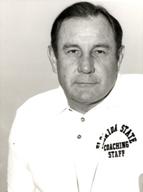Coaches come and go while our passion endures
By Charlie Barnes
If you happen to have one of those very old autographed photos Coach Bobby Bowden signed in 1976, look to see if he has written, “Hail to FSU, Hail.”
 |
Bobby Bowden |
Fans were so giddy about their new coach and so excited about the Seminoles’ future that hardly anyone asked about the odd sounding “Hail to FSU” signature.
The Bowden family had invested in Morgantown, West Virginia. Sons Terry and Tommy both played for the Mountaineers, coached by their dad. The film “We Are Marshall” lionizes Bowden in his role as WVU Head Coach. The only major school in the state possesses every conceivable professional school and its alumni dominate the Legislature. The Bowdens were fixed in place for the long term.
The West Virginia Fight Song ends with the line, “Hail to West Virginia! Hail!” That phrase became the obvious autograph signature.
Life was good in Morgantown, and Bowden was their most consistently successful coach. The Bowdens were embraced as the First Family of Mountaineer football.
It’s probable that on one crisp mountain day Bobby and Ann announced that they were Mountaineers in heart and spirit and always would be. It’s what coaches say.
But in 1974 the Mountaineer team went 4-7 and students hung Bowden’s image in effigy, visible to everyone in town and especially to his younger children on their way to school. The university administration refused to take the effigy down.
He and his family endured the humiliating effigy and all the rest of the usual media and fan uproar that year. However, the next season, the Mountaineers turned around and posted a 9-3 record with a victory over hated rival Pitt and a bowl win over N.C. State.
The effigy was gone, and so was Bowden. He smiled and announced that he had accepted the job at Florida State. He and Ann did not look back.
Upon arrival in Tallahassee, the Bowdens said something to the effect that they had often dreamed of returning to Tallahassee where Bobby had coached Seminole receivers in the early 1960s. “I slipped once too often on the ice up there.” Coaches say things like that.
Do you remember when Jimbo Fisher said Florida State was his dream job? We published a photo of him as a college player sitting on the bench during a game at Samford, wearing a Seminole hat and listening on the radio to the Florida State vs. Miami game in 1987. Terry Bowden was his head coach.
But shadows can fall across the brightest of dreams. Personal problems, mistakes in hiring and recruiting, the pressures of maintaining a top-tier program year after year all can wear.
Experienced coaches know when the time comes to find another dream.
The point of this column is simple: Coaches can always leave, but fans cannot.
 |
Bill Peterson |
The great Bill Peterson was elevated up from the ranks of assistants in 1960 to be head coach of the Seminoles. He called it his dream job. It’s what coaches say.
Peterson did remarkable work with the comparatively little infrastructure or financial support. He beat Georgia, Miami and Florida, and launched the careers of a Who’s Who of college and NFL head coaches.
But after 11 seasons the dream ended suddenly when Peterson announced he had accepted the position of head coach at Rice. Florida State administrators struggled through two more coaches in the next five years before they brought Bowden back.
The world of college football coaching is a closed culture with a more-or-less agreed upon structure of rules and expectations. It is considered bad form for coaches to say certain things; other nuances like displays of sportsmanship are honored.
A head coach will not publicly call out one of his players or assistant coaches. On the other hand, we fans have no trouble pointing out the most obvious flaws and shortcomings.
One head coach had just been beaten badly in recruiting by his bitter rival. A sportswriter asked him to compare the two recruiting classes. The fans, of course, were angry and wanted to hear Fan Truth. But the coach just said, “I wouldn’t trade my recruits for his.” It was Coach Truth.
The contrast between Fan Truth and Coach Truth is not a small thing. Passionate fans know when their program is on the wrong track. Of course, we fans are not competent in the realm of professional coaching, but fans can read a scoreboard and they monitor the result of the annual recruiting wars. And they know when losses on the field start to pile up.
Frustration erupts when the fans want to hear some public acknowledgement of problems and trends they believe are true. They want validation of the most obvious Fan Truths, but the coaches and administrators will not speak it.
For instance, you won’t hear a head coach in a postgame press conference say, “We lost to Arkansas because my running back is a punk who betrayed the team, and my defensive linemen don’t have enough talent to play Division I football.” Fans would love to hear it because they already believe it to be true, and they might praise the coach for speaking Fan Truth at the time. But hose scenarios seldom end well. Coaches expect each other to adhere to the professional code.
The reason Coaches don’t say certain things in public is they know that no job is permanent, not even the dream jobs. Probably half the current head coaches you can name have been fired sometime in their careers. And a good number of assistant coaches you can name have previously been head coaches at one time or another.
Coaches know that when the dream job collapses, they will have to look to their peers for another position. Any staff has more in common with coaches on the opposite side of the field in the opponents’ shirts than they do with their own fans. It’s the nature of the business.
Another reason for the reluctance to speak anything other than Coach Truth is the presence of so much money riding on every game and every decision.
Our Seminole Boosters are our permanent class of supporters. You are the ones whose contributions and participation provide the program with the means to succeed. We will always be here, and we are not reluctant to speak our minds.
Coaches can, and will, leave. We fans will always remain with the school and the team. Sometimes fans are left to mourn losing a great leader and program builder, and other times they’re left to clean up the mess another coach left behind.
Coaches know better than fans do how little loyalty can be expected. After 34 years and a pair of National Championships, Bobby Bowden was by any and every measure a true Seminole. And yet that chapter of the story did not achieve a blissful conclusion.
If your priority is winning, college coaching in the money sports is a brutal business. Make no mistake; our priority at FSU is winning so that we can raise the money to pay for the scholarships and facilities for all the other sports.
Never apologize for being an excitable, passionate fan. Never be reluctant to insist, loudly, on excellence. Coaches can always leave. True fans cannot.
Coaching is a much tougher business now perhaps than it has ever been. There is so much money on the table that there is little room for error; there is little forgiveness and no patience.
The days of a southern football coach resting on the front porch of a late career; relaxing in the shade and quiet and revisiting tales of victories with old friends are over. All that is gone.
They can always leave. You and I cannot.